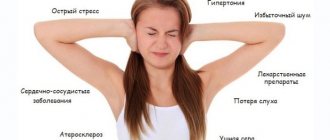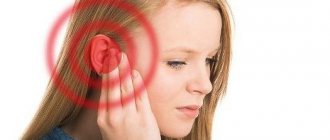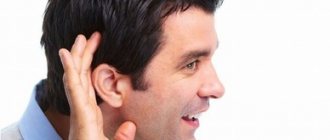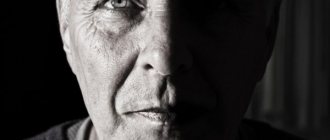A neurological pathology such as noise in the ears and head in the absence of any external stimuli is a very difficult diagnostic task for a specialist. This is not an independent diagnosis, but one of the symptoms that something is wrong in the body. In order to find out what disorders in the functioning of organs and/or body systems are indicated by tinnitus, dizziness and other possible accompanying symptoms and take appropriate measures, you need to consult a doctor.
The normal type includes mild unilateral or bilateral noise, which the patient notes at a time when it is quiet around him. Most often, this is a sound that is a consequence of blood flow in the small vessels of the inner ear - this is a natural process. Pathological noise in the ears and head, the treatment of which is a necessary measure, includes the consequences of various disorders of the middle and inner ear, diseases of the auditory nerve, intoxication of the body, etc. The patient himself may characterize such noise as a hum, ringing, hissing or whistling. Both this and the severity of its manifestation can all be important for making a diagnosis and selecting a treatment regimen!
Tinnitus is often combined with anxiety and fear, which puts the patient under stress. He cannot concentrate on anything, loses his ability to work, and in particularly advanced cases he cannot fall asleep. Over time, this can lead to depression. Do not expect that disturbing symptoms will disappear on their own - contact a specialist!
You can find out more detailed information and make an appointment by phone or through the online form.
+7 (812) 646 5460, +7 (931) 281 9718 Call back Make an appointment
High blood pressure as a source of noise in the head
Hypertension, the scientific term for high blood pressure, can occur as a consequence of severe stress or severe emotional stress.
However, high blood pressure is often systematic, which definitely indicates problems with blood vessels. If the pressure rises, the blood pressure on the weak walls of the blood vessels increases, and excessive blood volume leads to a feeling of buzzing in the ears. The pulsation of blood at this moment really “beats” right into the ear. Symptoms of high blood pressure:
- flickering “flies” in the eyes;
- aching pain in the head and in the region of the heart;
- redness of the skin of the face and neck;
- pulsation, buzzing in the head and ears.
You don’t have to be a chronic hypertensive patient to hear alien noise in your head. A “jump” in pressure can be provoked by the release of adrenaline (for example, during severe fright), which will cause vasospasm with a subsequent increase in pressure and tinnitus. But the combination of the above signs already indicates the development of cardiovascular disease and the approaching hypertensive crisis. In this case, immediate medical attention is initially needed, and only after the doctors have brought down the pressure, you should begin home treatment to stop the tinnitus.
Stabilizing high blood pressure at home:
- First of all, you need to purchase vasodilators and pharmaceutical antihypertensive drugs. The following medications will improve cerebral circulation, relieve buzzing and ringing in the ears, and also have a blood pressure-lowering effect: capilar, cavinton, actovegin, cinnarizine. Before starting treatment, you should consult with your therapist.
- The diet should exclude the use of coffee drinks, replacing them with chilled hibiscus tea, freshly squeezed beetroot and carrot juice and lemon juice. Beets, cranberries and viburnum should be present in your diet every day. Doctors advise adding boiled jacket potatoes to your daily menu. This vegetable is famous for its high potassium content, which can restore and maintain the elasticity of the walls of blood vessels.
- As additional remedies, traditional medicine recommends drinking infusions of herbs: motherwort, lemon balm, hawthorn, valerian and mint. Compotes made from a combination of black currants, rose hips and rowan berries stabilize blood pressure well.
After the pressure normalizes, the person will forget about the noisy discomfort in the ear canals. But if the above deviations are regular, then it is absolutely impossible to ignore the constantly appearing noise and ringing in the ears. It is necessary to urgently contact a doctor.
Doctors will be able to make an accurate diagnosis using:
- stethoscope (listening to tinnitus), otoscopy (examination of an enlarged ear canal), audiometry (setting the frequency range of sounds);
- long-term monitoring of changes in blood pressure;
- computed tomography, x-ray examinations, electroencephalography and magnetic resonance imaging.
In addition to medical care, you need to monitor the condition of the blood vessels yourself: give up bad habits, follow a daily routine and diet, take a daily contrast shower, do exercises in the morning, and, if possible, go swimming. Full compliance with preventive measures will allow you to maintain health and avoid such phenomena as buzzing and noise in the head.
Noise and ringing in the ears appear for various reasons, one of the main ones is blood pressure, or rather, a sharp change in either direction.
Changes in blood pressure can be observed not only in people with heart and vascular problems, but also in absolutely healthy people under the influence of external and internal factors.
Pressure surges are provoked by stress, overwork, and less often by hidden illnesses. Therefore, when ringing in the ears occurs, the pressure should be measured first.
Effective treatment
Enter your pressure
130
on
90
Search in progress Not found
What to do if there is noise in the ears and head? Of course, seek help from doctors. Only a thorough diagnosis can quickly find the cause that needs to be corrected.
Experts have developed a complex therapy for the treatment of patients with tinnitus. Medicines belong to different groups and have different mechanisms of action.
These include:
- medications to improve cerebral circulation (vasoactive);
- vitamins;
- nootropic drugs (have an effect on the higher mental functions of the brain);
- antidepressants;
- muscle relaxants;
- tranquilizers (sedatives);
- anticonvulsants;
- painkillers;
- vasodilators;
- antihistamines;
- diuretics;
- homeopathic medicines.
The goal of such therapy is to improve the blood supply to the entire body, as well as the energy processes of the hearing aid.
Effective treatment tactics:
- The factors for the development of hypertension are determined. Blood pressure is brought to the target. At this stage, an examination of the cardiovascular system, kidneys and thyroid gland is carried out. A blood test is done for biochemistry. Among the main recommendations of doctors are a healthy diet, exercise and treatment with modern medications.
- The level of cholesterol in the blood is determined and, if necessary, brought to normal.
- Blood circulation in the brain is normalized. For this purpose, a scheme of vascular therapy with modern drugs is being developed.
The duration of treatment can be up to six months, and the first results are already noticeable after two weeks of therapy.
Diagnostics
If a person is bothered by constant ringing in the ears and dizziness, then it is necessary to exclude head injuries, damage to the brain and hearing organs. Among the diagnostic measures, the patient can expect the following:
- examination by a doctor, a detailed survey about previous head and spinal injuries;
- CT and MRI of the brain to detect changes in brain structures, tumors of the auditory nerve;
- blood and urine tests will show pathologies of the endocrine system, brain tumors and hearing organs;
- An MRI of the cervical spine will show the condition of the vertebrae and the discs between them, and reveal a narrowing of the canal between the vertebrae;
- angiography of blood vessels in the brain will reveal atherosclerotic plaques and pathological narrowing;
- a hearing test allows you to determine the speed of information transmission from the inner ear to parts of the brain;
- audiogram – hearing acuity is checked in each ear;
- an appointment with a psychotherapist will be necessary if pathologies of the blood vessels and hearing organs are not identified.
Initially, the doctor prescribes diagnostics to exclude tumors of the brain and auditory nerve, then they continue to look for the cause of the problem.
Cerebrovascular accident
Occurs due to insufficient blood supply to the brain. Chronic fatigue syndrome may contribute to the development. In addition to ringing in the ears, accompanying symptoms in this case:
- headache;
- nausea;
- Pain in the eyes;
- numbness of body parts;
- fainting;
- convulsions;
- sharp memory deterioration;
- depression;
- the appearance of “flies” before the eyes.
Preventive actions in case of cerebrovascular accidents include reducing stress and regularly checking cholesterol levels. You should also pay attention to your diet. For this, the best option would be to talk with a nutritionist.
Noise in the ears and head
A manifestation such as tinnitus can be a consequence of a serious malfunction in the body, even if it does not appear often. This signal must be taken very seriously. There may be disturbances in the functioning of blood vessels or the brain.
If such alarming symptoms appear, it is necessary to conduct a comprehensive medical examination in order to determine an accurate diagnosis and, if confirmed, begin timely treatment.
Noise in the head and stuffy ears, causes
Quite often, noise in the head and ears in combination with headache appears with hypertension. With constant increased pressure, blood passing through the vessels of the body acts with great force on their walls and causes a sound wave. This wave is perceived by the human inner ear and creates the impression of noise in the head.
High blood pressure requires constant monitoring and the prescription of special medications to normalize it, otherwise irreversible consequences with damage to the heart, kidneys, and brain are possible.
Hypertensive patients should constantly take medications to stabilize blood pressure and exclude from the diet those foods and drinks that can cause its increase.
Noise in the ears and head, how to get rid of it
The appearance of a sharp sound simultaneously in the ears and head is characteristic of an incipient migraine attack. This is a state of so-called aura, lasting from 15 minutes to several hours, which can even be accompanied by auditory hallucinations.
At the first signs of an approaching attack, you should take a painkiller and try to take a lying position, placing your legs just above your head.
Noise in the head and ear, causes
If the noise occurs only in one ear and head, then there may be problems with the hearing aid. An otolaryngologist will help make a diagnosis and identify the cause of the disease. These manifestations are characteristic of ear inflammation or otitis media. Otitis media is caused by bacteria or viruses that can enter the ear as a result of inflammation of the respiratory system, meningitis, or hypothermia.
To treat otitis media, antibiotics are used to prevent the spread of infection and drugs for local treatment #8212; ointments, drops, compresses.
Dizzy, headache and tinnitus
As a result of a malfunction of the blood vessels of the brain, dizziness, headaches and noise in the ears may occur. Such violations can lead to:
- concussion;
- the formation of atherosclerotic plaques on the walls of blood vessels;
- diseases of the auditory nerve.
When dizziness and ringing in the ears are combined with severe nausea and vomiting after a fall or head injury, a concussion is likely.
Noise in the ears and head caused by atherosclerotic formations appears closer to the night and is accompanied by a decrease in the functioning of the vestibular apparatus and an unsteady gait.
Diagnosis of atherosclerosis is made using Doppler examination of the blood vessels of the head and, if the diagnosis is confirmed, appropriate treatment is started aimed at dissolving atherosclerotic plaques.
Cotton head and tinnitus, treatment
A constant lack of sleep and rest, insomnia caused by severe stress or prolonged depression can also lead to neurosis, the manifestation of which will be a feeling of heaviness in the head, buzzing or hissing in the ears.
Taking special sedatives, infusions and herbal decoctions will help normalize the condition.
It is important to adhere to a normal daily routine, alternate between work and rest, and be sure to have enough good sleep
Atherosclerosis of cerebral vessels, carotid and vertebral arteries
Why is my ears ringing?
Cholesterol plaques inside the brain's arteries obstruct blood flow, creating turbulence and causing noise.
How it rings
Patients with such diseases report constant or occasional noise in the head and tinnitus. Dizziness often occurs along the way.
What to do
First, consult a therapist or neurologist. In general, triplex scanning of neck vessels, MRI of the brain and angiography are used to diagnose atherosclerosis. Treatment depends on the degree of vascular damage and the nature of the atherosclerotic plaque. Cholesterol-lowering and vascular drugs may be prescribed, and in some cases surgical treatment is used.
Why is my ears ringing?
Osteochondrosis and other changes in the cervical spine, congenital narrowness (hypoplasia) of one or both vertebral arteries can lead to impaired blood flow. Typically, noise is not the only symptom in this situation. It is accompanied by systemic dizziness, coordination disorders, “spots” or “veils” before the eyes. Usually the manifestations intensify when turning and tilting the head.
How it rings
Indistinct noise, metallic ringing.
What to do
A full diagnosis is required - scanning of the neck vessels with head turns to the sides, radiography of the cervical spine with functional tests, MRI of the cervical spine.
Why is my ears ringing?
Swelling of the brain can also cause noise and ringing in the ears. In this case, the patient, as a rule, also suffers from nausea, vomiting, headache, dizziness, coordination problems, decreased visual acuity and other symptoms.
How it rings
Patients with traumatic brain injuries describe tinnitus as a squeaking or whistling sound.
What to do
It is necessary to conduct a hearing test - pure tone threshold audiometry in an extended frequency range. Treatment will be aimed at relieving cerebral edema, restoring normal functioning of cells and connections between them. It is also recommended to establish a sleep and rest schedule, listen to pleasant music, for example, the sounds of rain or forest.
Causes and associated symptoms
One of the reasons why tinnitus occurs is a decrease in blood pressure. With hypotension, blood moves slowly through the vessels, and important organs do not receive enough nutrients and oxygen. Poor supply to the brain causes ringing in the ears.
Tinnitus cannot be a disease, it is only a symptom.
Often tinnitus with low blood pressure is accompanied by other symptoms:
- headache;
- general weakness;
- clouding of consciousness;
- hearing impairment;
- loss of clarity of vision;
- nausea;
- feeling of breathing problems, lack of air;
- cold extremities;
- feeling of numbness in the arms and legs;
- impaired coordination of movements;
- decreased heart rate;
- metallic taste in the mouth;
- fainting.
Now you need to figure out why the pressure drops and eliminate the root cause. If the cause of hypotension is a disease, you need to treat it first.
Very often the pressure decreases due to:
- diseases of the gastrointestinal tract;
- vitamin deficiency;
- intoxication;
- dehydration of the body;
- fasting;
- allergies;
- diseases of the cardiovascular system;
- blood loss;
- stomach ulcers;
- the body's protective reaction to external climate changes;
- infectious diseases.
Also, there are cases when hypotension is recorded due to taking medications. Then, it is necessary to find out the feasibility of their further use.
In the absence of the above diseases, pressure can decrease and cause tinnitus after the manifestation of strong emotions and even in such ordinary situations as experiencing:
- stress;
- fear;
- pain;
- physical fatigue;
- after straining with constipation;
- being in stuffy rooms and transport;
- long standing in one position;
- hot bath;
- after drinking alcohol.
Often tinnitus with low blood pressure is observed with vegetative-vascular dystonia. In such cases, treatment comes down to normalizing vitality.
Also, ringing may appear due to diseases that are not associated with low blood pressure, but which other people can suffer from.
These include:
- head injuries;
- inflammation in the ears;
- tumors;
- some neurotic conditions due to stress, overwork, nervous disorders;
- toxicosis in pregnant women;
- osteochondrosis of the cervical spine.
If symptoms occur suddenly and do not go away or are repeated with a certain frequency, you should immediately visit a doctor and rule out the presence of serious illnesses.
Diseases of cerebrovascular and ENT organs
Perhaps this is the most common cause of patient complaints about tinnitus. After an ENT examination by a doctor, during which the cause is not identified, the patient is sent for examination to a neurologist, where he may be prescribed additional tests:
- Two-dimensional and three-dimensional scanning of the vessels of the brain and cervical spine;
- CT and MR angiography of the vascular system of the neck and head;
- MRI of the brain;
- Lipidogram.
The complicated flow of blood in some vessels of the brain entails a lack of nutrition and oxygen starvation of the area of the brain supplied by this vessel, causing extraneous sounds in the ear or head. For example, narrowing of the vascular lumen due to stenotic atherosclerosis or aneurysm and neoplasms in various parts of the brain.
What are the dangers of annoying ringing in the ears?
In addition, ringing in the ears often remains after acute respiratory viral diseases; the symptom is typical for the period after severe stress or physical exertion in athletes.
Other reasons for which a symptom such as ringing in the ears may develop:
- endocrine and metabolic pathological conditions - thyroid diseases, diabetes mellitus, low blood glucose concentration;
- diseases of the vascular system and heart - carotid aneurysms, arterial hypertension. atherosclerosis of the cerebral vessels of the head, high cardiac output, venous murmur, aortic valve insufficiency;
- tumor diseases - tumor of the brain stem or temporal lobe, meningioma. neoplasm of the cerebellopontine angle;
- degenerative conditions - atherosclerosis, consequences of poisoning by industrial poisons, Meniere's disease. cervical osteochondrosis;
- traumatic causes - head injuries. hearing organs. perilymph fistula.
Causes of tinnitus
Additional symptoms
Depending on the underlying cause of the unpleasant noise, other symptoms may accompany tinnitus. Quite often, the following manifestations of diseases appear with tinnitus:
Monotonous, constant noise appears due to inflammation of the ears, as well as diseases of the circulatory system. A pulsating strong ringing is characteristic of vascular pathologies.
If you experience tinnitus, regardless of whether you experience additional symptoms or not, you should consult your doctor immediately. The doctor will prescribe a diagnosis to the patient, based on the results of which he will be able to determine the exact cause of tinnitus and prescribe appropriate treatment.
Popular video about ringing in the ears and the dangers of this symptom:
Diagnosis and treatment
The doctor begins diagnosing tinnitus by collecting and analyzing anamnesis. Important information is the characteristics of the noise itself, the factors under which it intensifies, and the duration of the condition. The doctor is interested in what medications the patient is taking.
After collecting anamnesis, first of all, the hearing aid is examined for the presence of damage, inflammatory processes, and wax plugs, which can provoke the development of tinnitus. If there are suspicions of vascular disease, diagnosis is carried out by listening to the vascular system with a phonendoscope.
Age-related changes in the body are generally not treatable; the doctor can only prescribe supportive therapy and recommend a healthy lifestyle. In case of any diseases, targeted therapy is carried out.
Treatment can only be prescribed by a doctor; self-therapy can only worsen the condition, because when choosing treatment, not only the cause of tinnitus is taken into account, but also the degree of neglect, the condition of the patient himself, the presence of concomitant diseases and other factors.
Is it possible to cure tinnitus with folk remedies?
Folk remedies can be used only when processes are not running, and when ringing in the ears is caused by diseases of the hearing aid, for example, ringing in the right or left ear. Under no circumstances should you use home recipes in cases of serious inflammation, the formation of purulent foci, or tumors. Before using traditional therapy, be sure to consult your doctor.
Effective traditional medicine recipes:
- Dill decoction - to prepare the recipe, take three teaspoons of chopped dill and pour 0.5 liters of boiling water, leave in a thermos for two hours, take the finished product 100 milliliters orally before meals.
- Yarrow juice - in order to prepare the medicine, you need to pass the plant through a meat grinder and then squeeze out the juice. The resulting juice is instilled into the ear canal, three drops at a time.
- Onion juice - a small onion is passed through a meat grinder, and then the juice is squeezed out. Onion juice is instilled into the ear canal several times a day.
About the causes of ringing in the ears in our video:
Prevention plays an important role - with the help of simple rules, which include timely treatment of all diseases, including common colds, and maintaining a healthy lifestyle, you can avoid unpleasant symptoms and serious pathological processes.
Brain tumor, acoustic neuroma
Why is my ears ringing?
This occurs due to compression of the cochlear part of the auditory nerve by the tumor. The tumor can also compress the brain stem. If a large tumor develops, this can lead to loss of hearing, vision, and also threaten the patient’s life, since the respiratory and vasomotor centers are located in this area of the brain.
How it rings
First, noise appears in one ear (it may sound like ringing, squeaking, or the sound of sea waves), then hearing loss and dizziness begin.
What to do
To identify a tumor, computed tomography and magnetic resonance imaging are necessary.
Tinnitus can also occur with otitis, Meniere's disease (disease of the inner ear), cerumen plug and other ENT diseases, with anemia (decreased hemoglobin in red blood cells), endocrine diseases (thyroid diseases, diabetes), with mental and physical fatigue , taking toxic substances and drugs. And these are not all the causes of ringing in the ears! A similar symptom that occurs regularly is always a reason to consult a specialist.
Source: mhealth.ru
Low blood pressure as a root cause of tinnitus
A constant buzzing noise in the ears is promoted by a drop in blood levels, which in medicine is called hypotension. Low pressure causes vasoconstriction, causing blood flow to slow down. Insufficient blood supply, in turn, causes oxygen starvation of brain cells, and noise and rumble in the head turns into ringing.
Associated physical ailments with hypotension usually include:
A low blood pressure level can occur as a result of dehydration, overwork, large blood loss, or long-term fasting. Regardless of the reason for its appearance, it is necessary to take timely measures for recovery.
Treatment of hypotension:
For medications, you can take caffeine tablets or pharmacy tinctures of Eleutherococcus and ginseng extracts. It is also important to change the hypotensive menu. You should include in your diet: drinking - green tea with honey and freshly brewed coffee; food – dark grains, yellow and red vegetables and fruits
It is also worth diversifying your food with additional ingredients - mustard, grated horseradish, hot pepper. Eating these foods will cause your blood pressure to rise, as the blood in your arteries will move much faster. It is necessary to do home gymnastics and get a stimulating massage. Physical activity will relieve “hypotension” and allow the arterial column to move to a higher level. For low blood pressure, acupuncture and yoga sessions have worked well.
If the noise in your head only bothers you in the morning, then you should not rush into treatment. At dawn, all people, without exception, experience a decrease in blood pressure, but a few minutes after waking up, the pressure level is already normal.
Tinnitus in neurological diseases
Neurological pathologies cause tinnitus along with ENT diseases. Let's consider the most common causes of tinnitus, which fall under the competence of neurologists.
Arterial hypertension and hypertensive crises
With a significant increase in blood pressure (more than 140/90 mm Hg), blood flow to the inner ear becomes uneven. As a result, the nerve endings inside it are excited, and tinnitus occurs. With arterial hypertension, this most often occurs during a hypertensive crisis - an attack of a sharp increase in pressure.
Other manifestations of hypertensive crisis:
- headache;
- dizziness;
- dyspnea;
- pain in the heart area;
- nausea and vomiting;
- convulsions;
- disturbance of consciousness.
During a hypertensive crisis, the patient requires emergency assistance. It is necessary to reduce blood pressure as quickly as possible, otherwise its jump can lead to myocardial infarction, stroke and other serious complications.
If arterial hypertension is accompanied by a chronic disorder of cerebral circulation, then the patient is almost constantly bothered by tinnitus.
Cerebrovascular accident
The most common cause of impaired blood flow in the vessels of the brain is atherosclerosis. This is a disease in which cholesterol plaques form on the walls of the arteries, partially or completely blocking their lumen.
Other causes of cerebrovascular accident:
- arterial hypertension (the main cause of which is also often atherosclerosis);
- increased blood viscosity and blood clot formation;
- diabetes mellitus (with this disease, the vessels of the brain, eyes, and kidneys are primarily affected);
- consequences of traumatic brain injury;
- intracranial tumors, hemorrhages.
The main symptoms of chronic cerebrovascular accident: headaches, dizziness, tinnitus, flashing “spots” before the eyes, increased fatigue, drowsiness, impaired memory and attention. Constant oxygen starvation does not leave its mark on the brain. Gradually, the death of nerve cells occurs, over time this can lead to the development.
Increased intracranial pressure
Tinnitus as a result of increased intracranial pressure occurs with hydrocephalus, intracranial tumors and hemorrhages, after traumatic brain injuries and infections (meningitis, meningoencephalitis).
Everything is noisy and ringing in my head...
O.V. Veselago Candidate of Medical Sciences, otoneurologist, Research Institute of Neurology, Russian Academy of Medical Sciences
The human body constantly has conditions for the sensation of noise, because during its operation, so-called somatic, or vibrator, sounds are created. They arise as a result of breathing and heartbeat, muscle contraction, joint movement, blood flow in the vessels, etc. In a figurative expression, “a healthy body always sounds.” Usually a person does not hear these noises - they are masked by external sounds. Somatic sounds become perceptible and become audible noises under certain circumstances.
Causes of pathology
Why is there noise? Small vessels are damaged due to prolonged increases in blood pressure. The arteries of the brain are most sensitive to its surges. They lose their elasticity, and the gaps inside the vessels become narrow. The blood flow supplying oxygen to the brain is significantly reduced. This causes the patient to feel a buzzing in the ears and head. Dizziness may occur.
Noise itself is not a disease. But it indicates the presence of pathology in the body.
Experts identify three main factors that contribute to the appearance of buzzing in the ears:
| Groups of reasons | Character of noise |
| Inflammation of the ear or auditory nerve, circulatory disorders, head injuries when the perception, transmission and generation of nerve impulses are disrupted. | Monotonous noise against the background of hearing loss. |
| Reduction of lumens in the vessels of the brain, the presence of atherosclerotic plaques in the circulatory system. | A pulsating noise, the strength of which depends on the level of pressure. |
| Fatigue, neurotic conditions. | Increased auditory sensitivity. |
Classification
Due to the occurrence:
- damage to any part of the ear;
- somatic pathology.
According to the perception of people around:
- subjective;
- objective.
By the nature of the sound:
- creak;
- hiss;
- buzzing;
- ringing;
- whistling;
- squeak;
- buzz.
Tinnitus is also divided into one- or two-sided, which, along with the nature of the sound, affects the diagnosis of pathology and the treatment of tinnitus.
Also, noise in the ears and head is divided depending on the degree of severity:
- First degree - the patient remembers this symptom only during a specific detailed interview, the noise in the head practically does not bother him and does not interfere with leading a full lifestyle.
- The second degree is tinnitus, which significantly bothers the patient. The patient names it along with his other symptoms and complaints. This condition significantly affects the well-being, and therefore the life of the patient.
- Third degree noise in the ears and head is the main symptom that brings the patient to the doctor. Noise in the head prevents a person from living normally; it is strong and constant. The patient cannot distract himself from it, sleep is disturbed. A person wakes up in the morning and immediately feels a noise in his head, which makes him nervous and irritable.
This classification is very important not only for making a diagnosis, it also allows, based on the patient’s subjective feelings, to draw conclusions about the results of the tinnitus treatment being carried out.
For low blood pressure
Low blood pressure can also cause a buzzing sound in the ears. Hypotension is as dangerous to humans as hypertension. At low blood pressure, the human brain experiences oxygen starvation due to slower blood flow.
Causes of low blood pressure may include:
- prolonged fasting;
- overwork;
- large blood loss;
- intoxication of the body.
All these factors are accompanied by a decrease in the volume of pumped blood. A sharp decrease in pressure, which is accompanied by noise sounds, can cause disruption of the blood supply to internal organs. And this condition, in turn, creates a threat to the patient’s life.
Diseases of the cardiovascular system
In terms of importance, this reason, of course, comes first. But in practice, patients suffering from pressure changes get used to periodic tinnitus and rarely turn to specialists about this.
Tinnitus, due to cardiac problems, accompanying pressure fluctuations, occurs both in hypotension and in hypertensive conditions.
With low blood pressure, characteristic of vegetative-vascular dystonia, common among young girls and women, in addition to ringing, the following usually appear: weakness, dizziness, narrowed vision, pallor, loss of consciousness. The reason for a sharp decrease in pressure can be: stuffiness, reaction to high air temperature (for example, a sauna), blood loss, oxygen starvation, medications.
No less often, tinnitus is accompanied by increased blood pressure. In addition to the above symptoms of changes in pressure, during a hypertensive crisis the following are added: migraine-like headaches in the back of the head, nausea, vomiting, intense redness of the skin.
Prevention
To prevent the occurrence of unpleasant symptoms with blood pressure, doctors advise:
- avoid industrial and city noise;
- Healthy food;
- take multivitamins regularly;
- increase physical activity;
- practice walks in the fresh air;
- avoid hypothermia;
- do self-massage of the neck;
- listen to calm music more often;
- do yoga or meditation;
- undergo examinations by a cardiologist and an ENT doctor.
Irritating tinnitus with high blood pressure is a reason to consult a general practitioner or cardiologist for help. Delayed treatment and lack of knowledge about the cause often lead to disability and death.
THERE ARE CONTRAINDICATIONS CONSULTATION WITH YOUR DOCTOR IS REQUIRED
Author of the article Svetlana Anatolyevna Ivanova, general practitioner
Headache can be accompanied by various symptoms, such as noise or ringing in the ears. What are the causes of these signs and whether they may indicate the presence of a serious disease, read further in the article.
Discussions
Good day#33; I have ten years of experience in torment with this ringing problem in my head. It’s hard to say where it all started. As a child, there were injuries, falls from heights, at the age of 17 I was diagnosed with VSD, at the same time I had an acute respiratory viral infection - I was treated in the hospital, discharged, and on the very first night after discharge I heard this ringing. I felt scared, my blood pressure rose, I was shaking all over - they called an ambulance and went back to the hospital. After unsuccessful treatment, about a month later, I got used to this ringing. The doctors reassured me and said that it was all due to nerves, walk more, strengthen the blood vessels and drink glycine. But from time to time this ringing haunts me. I realize that it shouldn’t be normal. I want to find the reason, maybe I can do an MRI to see where this signal is hidden?))) Who did the MRI? Who has what results? There is an assumption that the cause of my tinnitus is intracranial pressure.
Intracranial pressure is an accumulation or lack of cerebrospinal fluid in a certain part of the skull, caused by a violation of its circulation.
The name of the liquid is liquor. It is located in the ventricles of the brain, in the spinal cavity, as well as in the space between the bones of the skull, bone marrow and brain. Liquor protects the “gray matter” from severe overloads and mechanical damage.
The liquid is always under a certain pressure. It is constantly updated, circulating from one area to another. The process usually takes about seven days. But sometimes it is disrupted and cerebrospinal fluid accumulates in one place. Increased intracranial pressure occurs. If there is a decrease in cerebrospinal fluid, then decreased intracranial pressure occurs.
A decrease often occurs after a head injury, with brain tumors, with prolonged vasoconstriction, and also due to long-term use of diuretics.
The main causes of ICP are:
Disruption of metabolic processes in which fluid is poorly absorbed into the blood; Spasmed vessels through which cerebrospinal fluid cannot circulate normally; Excess fluid in the body, resulting in an increase in the amount of cerebrospinal fluid; Brain hypoxia; Meningitis; Stroke; Migraine; Encephalitis; Hydrocephalus; Tumors; Excess weight; Severe poisoning; Excess vitamin A. Symptoms of intracranial pressure:
intracranial pressure Swelling of the optic nerve; Impaired eye reaction; Deterioration of peripheral vision, and then central; Double vision; Swelling of the face and eyelids;
Hearing loss, tinnitus;
Headache. Intensifies in the morning, a person feels “broken”; Nausea, vomiting; Pain when turning the head, coughing and sneezing; Attacks of sweating, decreased blood pressure; Presyncope; Irritability; Weakness; Fatigue; Appearance of bruises under the eyes; Pain at the top of the cervical vertebra and spinal cord; When is surgery necessary?
If a skull injury has occurred. Due to the blow, a hematoma may occur, which will provoke an increase in intracranial pressure; Severe headache and fainting. In this case, most likely, a vascular aneurysm has ruptured. Intracranial pressure should always be treated, and not wait until an accident occurs.
In infants, the presence of a problem is indicated by an increased head size and strabismus. Children of school and preschool age develop fatigue, irritability, and increased sensitivity.
Doctors determine the presence of a problem using many data, including:
Stagnation of the optic nerve head; Impaired outflow of venous blood. In addition, adults and older children undergo computed tomography and magnetic resonance imaging, and infants are examined using ultrasound of the skull through the fontanel.
Another method is to insert a special needle with a pressure gauge into the spinal canal or fluid cavities. This procedure is far
Why "Movement"
- The clinic is located in the Vyborg district of St. Petersburg, near the Ozerki metro station.
- Reception is carried out by qualified doctors who have many years of experience in treating various neurological diseases and problems of the musculoskeletal system.
- Comprehensive treatment programs developed by our specialists, in the vast majority of cases, make it possible to avoid surgical intervention even in very complex clinical situations.
- Prices for medical services are affordable.
Shepherd's purse - restores elasticity to vessels
In addition, such people’s vision also begins to deteriorate. In the morning, after sleep, the eyes are filled with tears. In the evening sky, for example, the moon appears double, and a yellow glow appears around an electric light bulb. This all happens because the intraocular pressure is disturbed, and a serious disease begins - glaucoma.
It is very important to consult a doctor when these first symptoms appear and undergo the necessary course of treatment. Today there are many antihypertensive and antisclerotic drugs, but they only reduce blood pressure, and the cause of hypertension remains
In addition, over time, the pills affect other organs, and the body becomes accustomed to these medications.
How to restore elasticity to blood vessels without pills
However, there is a good method to clean the blood vessels and restore their natural elasticity without pills. And this will be helped by a seemingly inconspicuous plant that we see every day - shepherd's purse (popularly it is also called viburnum, bags, shepherd's grass).
Our ancestors also noticed its healing properties when, having tasted the first leaves in the spring, they felt an improvement in the functioning of the stomach, intestinal motility, normalization of blood pressure, and the disappearance of headaches.
Our grandfathers and great-grandfathers also noticed that the juice from the leaves of the shepherd's purse heals wounds, the plant has a pronounced hemostatic effect. In addition, it treats the stomach, kidneys, liver, blood vessels, and nervous system.
Helps prevent intoxication of the body, when blood stagnates in the right side of the liver and a so-called rotten lake of blood is formed, cleanses the gallbladder, improves bile circulation, crushes and removes stones from the body.
As already noted, shepherd's purse also heals the kidneys. Removes sand and water from them, as well as from the bladder. Thanks to this, a person becomes slimmer, his stomach tightens, and he does not get tired so quickly.










